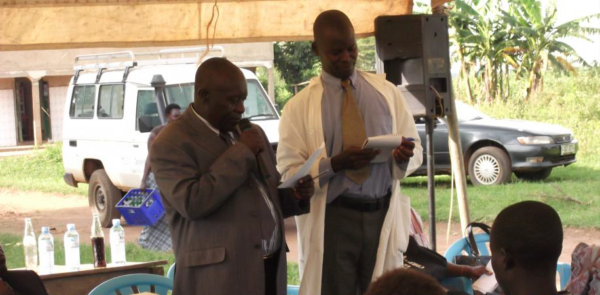
IMPLEMENTING PARTNERS: Anti Corruption Coalition Uganda (ACCU); Uganda Law Society (ULS); Northern Uganda Anti Corruption Coalition (NUACC)
YEAR(S): 2011-2012
THEME(S): Health
GRANT AMOUNT: $35,000
This project was implemented by Anti Corruption Coalition Uganda (ACCU) in partnership with Uganda Law Society (ULS) with the support of Northern Uganda Anti Corruption Coalition (NUACC). The purpose was to reduce leakage of free malaria medicines by monitoring of the supply chain from the National Medical Stores (NMS) to the public health centres. The overall goal of the project was to improve public access to free malarial medicines destined for selected health centres in Lira district.
Project Activities
At the inception of the project, ACCU conducted a baseline survey in eight selected health centres in Lira District that explored the status of the delivery chain of medicine from NMS. A report was produced that highlighted the loopholes in the flow of medicine to health centres in Lira district that included among others: inadequate investigations of complaints regarding drug leakages, unlabeled tablets and poor record management.
ACCU also organized a training workshop for Independent Budget Monitors (IBMs) of Northern Uganda Anti-Corruption Coalition (NUACC) to equip IBMs with refresher skills and knowledge necessary for effective and efficient monitoring of public health centres in Lira District and to share experiences with NUACC on the state of corruption in the country. A total of seventeen bicycles and five cameras were also provided to monitors in addition to a facilitation fee of 21,000/= per month to cover any monitoring related cost. With this facilitation, monitors engaged in monthly monitoring of the eight project target health facilities in Lira district.
A total of four (4) Public Accountability Forums were held for the project. The overall objective of the PAF was to provide a platform for dialogue between duty holders and communities on the emerging issues relating to anti-malarial medicines. A combined total of approximately seven (700) people participated across the four PAFs. Politicians and technocrats participated in these forums and included the District Health Officer, Deputy Resident District Commissioner, Health Personnel, Local Council Chairpersons and Health facility users.
Several activities were also undertaken under a media and publicity campaign. A newspaper supplement was run in a local newspaper. Posters and Stickers were developed and bore messages that encouraged transparency and accountability in the supply and provision of anti-malaria medicines. The message called for vigilance from the community in monitoring drug supply with view of preventing leakages of anti malaria medicines. A total of 150 radio spots were aired to the public at the local level in Lira district for a period of 60 days urging community members to play a role in preventing leakages of anti- malarial within their respective health centres.
Project Results
During the periodical monitoring of the fourth quarter project, it was discovered by the team from ACCU and MHSDMU that NMS had supplied an anti-malarial drug (Fansidar) that was later recalled back by National Drug Authority (NDA) for having no met the standard for human consumption. This case was followed up by members of the Health Sector Anti Corruption Working Group. Shortly after presenting this case, the National Drug Authority came out recalling all substandard drugs and has suspended pharmaceuticals companies involved in the production of fake drugs.
Monitors were pivotal in following up a case of suspected drug theft at Ogur HC IV. In October 2011, Joan Akello a volunteer at the Anti Retro Viral clinic at Ogur Health Centre IV was allegedly caught stealing 3 boxes of Anti-Malaria drug (Coartem) from the drug store of Ogur Health Centre IV. The accused was arrested and later had her file forwarded to the Central Police Station in Lira District. She was sentenced her to 3 months of Community Service and the stolen drugs had been recovered.
NUACC was nominated to have a representative at the District whenever drugs from National Medical Stores are delivered. In liaison with the office the District Health Officer, the monitor has been available to ascertain the actual deliveries of anti-malaria medicines by National Medical Stores. Vans directly supply to lower health facilities during cycle six (6) of the delivery schedule according to information acquired from interviews with health facility personnel. There have been no more reported cases of night deliveries at any of the project health facilities.
Free anti-malarial tablets were embossed with UG implying that were supplied by Government of Uganda and are not for Sale. This helps counter leakages as such drugs cannot be sold in the private market.

